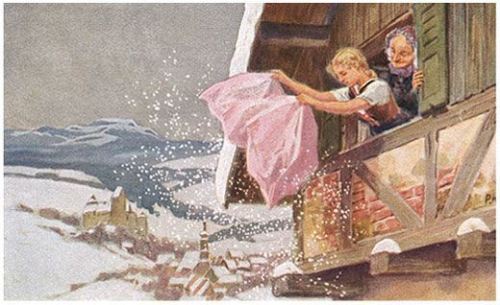An extra poem today, because Theodora Goss.
How to Make It Snow
How to Make It Snowby Theodora Goss
First you must fall down the well.
At the bottom of the well
is the country at the bottom of the well.
That is its name, the only one it has.
You have two names, either the beautiful girl
or the kind girl, depending
on what day it is.
At the bottom of the well is a green meadow,
just like in the country you came from
but different. For one thing, the cows can speak.
They say, “Scratch our backs, scratch us
under the chin,” and you do.
The meadow is filled with poppies
and cornflowers. The air is warm,
and the sun is shining.
“Thank you, beautiful girl,” say the cows
and you walk on.
Across the meadow, there is a narrow path
worn by cow hooves. Follow it.
First you come to the oven.
“Take me out, take me out,” cries the bread.
“I’m burning up!” You take it out,
a brown wholemeal loaf. Carry it with you
for the birds — they appear later.
Next you come to the apple tree.
“Shake us down, shake us down,” cry the apples.
“We’re ripe!” So you shake the branches, as though
you were dancing with them.
The apples come tumbling down.
You put three in your pocket.
Now you are at the edge of the forest
and the birds call, “Feed us, feed us!”
You ask the loaf, “May I?”
“This is what I was baked for,” says the loaf.
So you scatter breadcrumbs
and the birds come, sparrows and chickadees,
robins and finches and juncos,
and a nuthatch. They perch on your arms
as you feed them. Absentmindedly,
you whistle as they do.
In the forest, a wild sow approaches.
For the first time you are afraid and step back,
but she says, “My little ones are hungry,
and I smell something sweet.”
You pull the apples out of your pocket.
“May I?” you ask, and the apples reply,
“This is why we fell.”
You kneel while the sow watches protectively,
feeding the apples to her three piglets,
bristle-backed, with tusks just starting to form
but still striped as though someone had marked them
with her fingers. The sow nods and says,
“You are a kind girl.” Then, followed by her progeny,
she disappears into the trees.
You continue alone.
It is getting dark. You have passed through the oaks
and now it is all pines. You are walking on needles.
The light is fading when you come to the cottage.
It looks like the cottage out of a fairy tale:
peaked roof like a witch’s hat, dark green trim,
small-paned windows through which firelight is flickering.
Someone is waiting for you.
You have nothing left, no bread, no apples.
So you knock.
The woman who answers is old, small,
like a doll made of cornhusks.
“You’re hungry,” she says,
“and tired. Come in, my dear.
The soup is almost ready.”
There is a fire, and a cauldron on the fire,
and a chair by the fire, and a cat in the chair,
and you can smell the soup.
“Come on, then,” says the cat, and gets up,
but only to settle again in your lap
once you sit down.
Here are the things you know about the old woman:
she milks the cows, she causes the apples to ripen,
she teaches the birds their songs, she runs her fingers
along the backs of the wild piglets
to put the stripes on them.
Here are the things she knows about you:
everything, also your name.
“What are you called, my dear?” she asks.
“The beautiful girl,” you answer. “Or the kind girl.”
“No,” she says. “From now on, you shall be
she who makes it snow.
Or Holle, for short.”
Holle: it suits you.
“Here’s what I’d like you to do tomorrow morning.
Sweep the floor and dust the shelves,
wash the curtains and wind the clock,
polish the silver. And when that’s done,
shake out my bedspread until the feathers
fly like snowflakes. It’s time for winter.
Can you do that?”
You nod. Yes, of course.
That night you sleep under the cat,
in her attic bedroom.
The next morning, you put on an apron she left for you,
then sweep the floor and dust the shelves,
wash the curtains in a metal basin,
wind the clock and polish the silver. Finally,
you stand on the cottage steps under tall pines
and shake out the old woman’s bedspread.
Snow falls and falls, until
the forest is silent.
“Well done, my dear.” She’s wearing a gray wool coat
and carrying a battered suitcase. “Can you do that again
tomorrow morning, and the day after tomorrow?
I need to visit my sisters, and I’m not sure
when I’ll be back yet.
It takes a responsible girl, but I’ve heard good things
about you from the cows, the bread, the apples,
the birds, even the trees. And the cat likes you.”
“I’ll do my best,” you say.
She kisses you on both cheeks, then rises up, up,
through the trees until she is only a speck
in the colorless sky.
You go back into the cottage.
There is a cat to scratch under the chin,
and books with stories you have never read,
and you haven’t introduced yourself to the clock yet.
Besides, you like your new name.
It’s the right name for a woman
who makes the snow fall.

(If you know fairy tales, you’ll recognize this poem as a sort of prequel to the Grimms’ “Frau Holle.” I could not find a source for the illustration, but I’m guessing it’s from an early 20th century edition of Nursery and Household Tales.)
http://theodoragosspoems.com/2015/12/11/how-to-make-it-snow/
(I love this lady :D )
Comments
Post a Comment